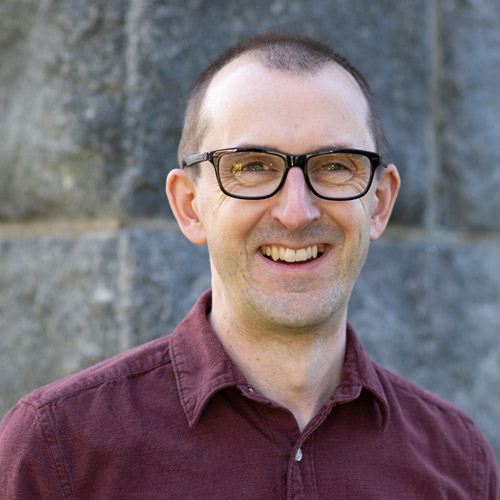The Energy of Ancestors
STH student uses his church’s past to shape its future

Brandon Thomas Crowley, the senior pastor at Myrtle Baptist Church in West Newton, Mass., is revitalizing the storied institution by drawing on its past. Photo by Karin Dailey of KMD Photography and Digital Art
In 1847, 29-year-old Edmond Kelley—born into slavery and the property of the White family of Columbia, Tenn.—became a free man. His wife and four children, slaves of one J. Knox Walker, were not so fortunate. It would take four years for Kelley, a preacher and the future founder of Myrtle Baptist Church in West Newton, Mass., to buy his family’s freedom. In an era when the average New England millhand earned $175 a year, Kelley had to raise $2,800. He wrote fundraising circulars, penned ballads, sold letters—and incurred significant debt.
By the time of his death in 1894, Kelley had served the New England Missionary Baptist Convention and was said to have met with Presidents Lincoln and Jackson. He’d also founded Myrtle Baptist with the aim of bringing together suburban Newton’s small black population—some 130 at the church’s founding in 1874. (The church was added to the National Register of Historic Places in 2008.)
“It gives me a charge, the energy I need to keep going forward,” says Myrtle’s current senior pastor, Brandon Thomas Crowley (STH’12,’19), a School of Theology doctoral student, of the church’s history. Crowley has helped open a small church museum that includes the freedom papers of early members and letters from Martin Luther King, Jr. (GRS’55, Hon.’59), a frequent visitor to Myrtle Baptist during his time at BU in the 1950s. Walking through the museum allows Crowley to “feel the energy of these ancestors who built this church at a time in history when racism, segregation, degradation, and marginalization were so high.”
If they could open a church in that hostile atmosphere, says Crowley, there’s a “greater calling on persons like myself who are in this present generation, who have been given all these resources—doors have been opened for us that our ancestors could’ve never dreamed of. It helps me realize some of the stuff I complain about really doesn’t matter at all.”
By church pastor standards, Crowley is young. He was interviewed for the job at Myrtle at age 21; he was 22 when the congregation voted to offer him the position in 2009.
“Growing up, all of the pastors in the Baptist churches were older than I,” Crowley says of his upbringing in Georgia. They were also conservative. After a sermon on the likelihood of “gay people going to hell,” 11-year-old Crowley told his grandmother he didn’t get it: God loves everyone, but gays are going to hell? “I said, ‘I think God’s calling me to stand up for something.’” She “looked at me kind of strange”; later she’d wonder how her grandson’s four theological degrees—two from BU, one from Morehouse, and one from Harvard—would enable him to make a living.
Since becoming senior pastor at Myrtle Baptist, Crowley’s living has been revitalizing the storied institution, “not necessarily changing the theological motif of the church,” he says, “but really accenting it and putting more focus on its liberal acceptance.” He has also launched a lecture series that has drawn leading researchers, scientists, and theologians, and created 18 new ministries, including a youth ministry led by Carrington Moore (STH’14). The church has added 200 new members since Crowley took the pulpit.
Myrtle Baptist’s home city is affluent—median household income in Newton is north of $100,000. With lawyers, engineers, professors, and doctors lining the pews, Crowley says, there’s an obligation to “take those resources and answer questions and create solutions to what’s happening in minority neighborhoods,” such as Roxbury, Dorchester, and Mattapan in Boston. The church has partnered with BU to enroll incarcerated African Americans in degree programs and joined with Dorchester’s Brookview House and City Mission of Boston to help address issues of poverty and homelessness.
One of his biggest projects, however, is right across the street from the church. When he first joined Myrtle Baptist, Crowley was sorting through an old closet when he found a set of blueprints for church-backed affordable housing, a dream his predecessor had held close, but had never been able to bring fully to life. The new pastor called the church leadership together to make it happen. With a grant from the city, the church is creating seven affordable housing units, called Myrtle Village. Three units have already been completed, with the others currently under construction.
“We are changing and evolving into a very different church now,” he says. “But you cannot change things without an appreciation of what once was.”
Today, the church has some 500 congregants to drive its many ministries. More than 140 years ago, just a decade after the passage of the 13th amendment, Myrtle Baptist consisted of 18 African Americans under the leadership of a onetime slave. Crowley became pastor by a vote of the congregants of Myrtle Baptist—when his antecedent Edmond Kelley took on his first church in Tennessee, his Baptist association had to take a different approach: “It is important for this association to raise a fund, and purchase [Kelley] to preach to the colored population of this country, under the direction of this body.”
Andrew Thurston can be reached at thurston@bu.edu.

Comments & Discussion
Boston University moderates comments to facilitate an informed, substantive, civil conversation. Abusive, profane, self-promotional, misleading, incoherent or off-topic comments will be rejected. Moderators are staffed during regular business hours (EST) and can only accept comments written in English. Statistics or facts must include a citation or a link to the citation.